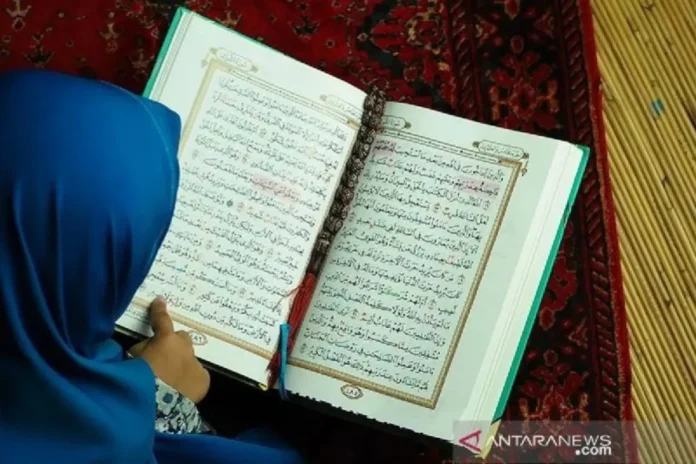JAKARTA, BERITAPOLITIK.ONLINE — Reading the Al-Quran is not just an ordinary reading activity, but a noble and full of virtue. In Islam, etiquette and ethics need to be considered so that each letter that is pronounced brings blessings and rewards.
Starting from maintaining self-sanctity to paying attention to the intonation of reading, all have a basis in the teachings of the Prophet. By understanding and applying the etiquette of reading the Al-Quran, Muslims not only strengthen relations with the Scriptures but also show respect to the Word of Allah SWT.
The following is a good guide or manner when you want to read the Al-Quran according to Islamic teachings, which have been collected from various sources.
Guide to Adab in Reading Al-Quran Good
1. Fix the sound when reading it
Beautifying the sound when reading the Al-Quran is a highly emphasized recommendation. Rasulullah SAW said: “Be a beauty reading of the Al-Quran with your voice.” (HR. Ahmad, Ibnu Majah, and Al-Hakim).
The meaning of this hadith is that we read the Al-Quran with a clear voice, pay attention to the pronunciation of letters (Makhraj), as well as comply with the length of the reading following the rules of the recitation. However, there is no need to force the sound to be excessive or made up outside of ability.
2. Clean the mouth before reading
Before reading the holy verses of the Al-Quran, it is recommended to first clean the mouth. This is because the mouth is a place for letters to be read when reading, which is called Makharijul letter.
Cleaning the mouth is classified as a sunnah because it can help pronunciation become clearer, more comfortable, and confident. The easy way is to rinse or brush your teeth first. When the mouth is clean, reading the Al-Quran feels even more solemn without a disturbing odor or discomfort.
3. Wash first
Before reading the Al-Quran, it is important to be in a holy state. Washing is not limited only to cleaning clothes, but also the body, which is an act of ablution. As a great holy book, the Al-Quran must be fully respected, including by maintaining purity when reading it.
Although children have not been required to be abluted, parents should begin to get used to doing it before reading the Al-Quran to form good etiquette from an early age.
4. Sitting facing the Qibla
Reading the Al-Quran should be done in a quiet sitting position and facing the Qibla. Since childhood, these manners have been introduced as a form of respect for the Scriptures.
Qibla, as a direction towards the Kaaba in Mecca, is a symbol of holiness in Islam. Because reading the Al-Quran is worship, it should be done in a full way, including by maintaining the direction of sitting to face the Qibla.
5. Using the right hand when holding the holy book
In adab reading the Al-Quran, it is highly recommended to hold the Manuscripts (physical form of the Al-Quran ) and use the right hand. This is following the habits of the Prophet, who always used the right hand for good things, such as eating, drinking, or using fragrances.
Therefore, when you want to take or read the Al-Quran , you should use your right hand as a form of respect. Because the left hand is generally used for things of personal hygiene, such as after using the toilet.
6. Understand and pay attention to the recitation
One of the most important things in reading the Al-Quran is to pay attention to the law of recitation. Do not let the reading be wrong because of negligence in applying recitation, considering that Arabic, as the main language of the Al-Quran, has a complex structure.
A small mistake in pronunciation can change the meaning. Therefore, read the Al-Quran with caution, accompanied by a rhythm or song that is appropriate, as taught by the Prophet Muhammad. That way, our reading will bring good and blessings.
7. Read Ta’awudz first
One of the adabs before reading the Al-Quran is to start with Ta’awudz’s reading. This reading is important as a form of request for protection to Allah SWT from the temptation of the damned devil.
Although the law is Sunnah, this reading should still be done before starting to read the verses of the Al-Quran. Ta’awudz is generally read before Bismillah, then followed by reading the destination letter or verse.
Reading Ta’awudz not only purifies orally, but also invites blessings and closer to angels. This also shows someone’s closeness to the Al-Quran itself.
8. Read Bismillah
After Ta’awudz, it was discussed to read “Bismillahirrahmanirrahim” at the beginning of the letter, except for the letter at-taubah (bara’ah). However, if someone starts reading from the middle of the letter, just read ta’awudz without the need to read bismillah.
9. Read solemnly
Reading the Al-Quran should be done in a solemn state. As in prayer, solemnity when reading the Al-Quran is highly recommended so that the reading feels more meaningful and touching.
Try to focus fully, far from distractions or thoughts that distract. This solemnity will help us understand the contents and meanings of the verses of the Al-Quran better.






